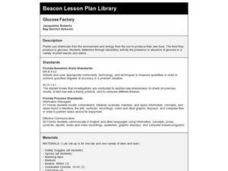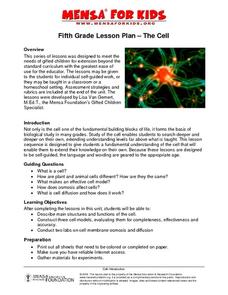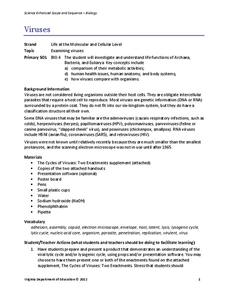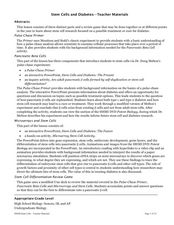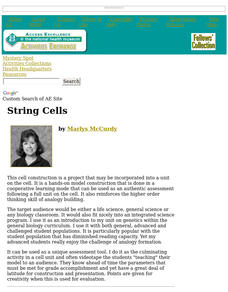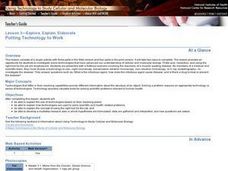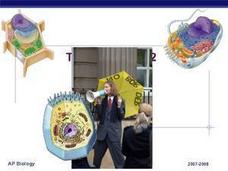Curated OER
Glucose Factory
Fourth graders determine, through laboratory activity, the presence or absence of glucose in a variety of plant leaves and stems. They work in groups and perform a three part laboratory which shows them how plants convert sunlighht to food.
Curated OER
GMOs: Should We Grow Them?
Students examine the ethics of biotechnology and genetically modifying various organisms. They complete various activities and labs on GMOs and then write a position paper regarding their individual opinions on the subject.
Curated OER
The Cell
Tenth graders explore the parts of a cell. In pairs, classmates construct a model of a eukaryotic cell, detailing its morphology and function. With the use of computer technology, 10th graders create cell book for middle schoolers. ...
Virginia Department of Education
The Effects of Heat and Acid on the Enzyme Catalase
How quickly do enzymatic reactions occur? Assist the class as they examine heat and pH change to determine the rate of chemical reactions using catalase as an enzyme. Watch them "glow" with excitement!
Virginia Department of Education
Viruses
Germs, parasites, and viruses, oh my! Facilitate a lesson on viruses as individuals explore functions of Archaea, Bacteria, and Eukarya. They learn how viruses compare with other organisms in nature and how they contribute to health...
Howard Hughes Medical Institute
Stem Cells and Diabetes
Students investigate stem cells. In this science instructional activity, students discuss stem cells and view a video about human embryonic development. Students conduct the pulse-chase.
Curated OER
String Cells
Use this resource to have your class learn about the cell. This resource walks learners through the construction of a model of a cell. This project is completed in a cooperative learning group, and reinforces the higher-order thinking...
Curated OER
Pharmaceuticals and Treatments
Learners perform an experiment involving reverse transcriptase-polymerized chain reaction HIV replication to better examine the biotechnology used by scientists in pharmaceutical research of infections diseases like HIV. Students examine...
Curated OER
Technology-Lesson 3-Putting Technology to Work
Students explain the use of different technologies based on their resolving power. Explain how technologies are used to solve scientific and health-related problems. Explain the concept of using right tool for the job and develop a multi...
Curated OER
Tour of the Cell 2
As your class views each slide, they will be introduced to the organelles and structure of the cell. Details about structure and function are given and also some trivia about their frequency and population. There is also some...
Curated OER
Cell Division
High schoolers describe the cell cycle. They make a connection between DNA replication and cell division. Students describe the parts of the cell that participate in cell division and the steps of cell division.
Curated OER
Student Cancer Journals -- Personal Reflections and Research on Life and Death Issues
Concepts learned in the study of mitosisand biochemistry help when making life or death decisions. Compile a notebook or portfolio of work related to the project can make the research more organized and relevant.
Curated OER
Cell-to-Cell
Ninth graders use online tutorials, class discussion, presentations and scientific articles to explore types of cells along with cell structure, function and behavior. They explore ethical questions related to cells and disease.
Curated OER
The Challenge to Deliver Insulin
Students study the types of diabetes and why insulin is important. In this diabetes lesson students build molecular models and create a healthy lifestyle plan.
Curated OER
Anatomy of Living Bone
Students analyze and examine the anatomy of bones and bone conditions. In this bone anatomy lesson, students analyze and examine the structural properties of bones. They explain the relationship between osteoblasts and osteoclasts and...
Curated OER
Cell Observation Exercise
Learners take measurements of the distance between the objective and the slide when in focus with each objective. They determine the diameter of the field of view at each power in order to determine the size of the cells being observed.
Curated OER
Algae in the Aquarium
Tenth graders determine the cause of an algal bloom in a classroom aquarium. Students analyze the situation and present a solution to the problem in the given time frame after researching and conducting experiments. Solutions are...
Curated OER
Biotech in a Bag
Students carry out a series of experiments using self-locking plastic baggies. Each experiment demonstrates a phenomenon or principle of biotechnology.
Curated OER
A Cell Is Like A City
Students create analogies that help them remember the cell parts as well as their respective functions.
Curated OER
Time Lapse Seed Germination with the QX3 Intel Digital Microscope
Learners use the time-lapse feature of the QX3 Intel Digital Microscope
to observe germination of seeds. They use the QX3 Intel Digital microscope to create time lapse video films of seed germination experiments.
Curated OER
Introduction to Mendelian Genetics using Fiction
Students investigate Mendelian Genetics by studying the history of Mendel and what it was like to be a 19th century scientist. They read a pieces of fiction during this investigation.


